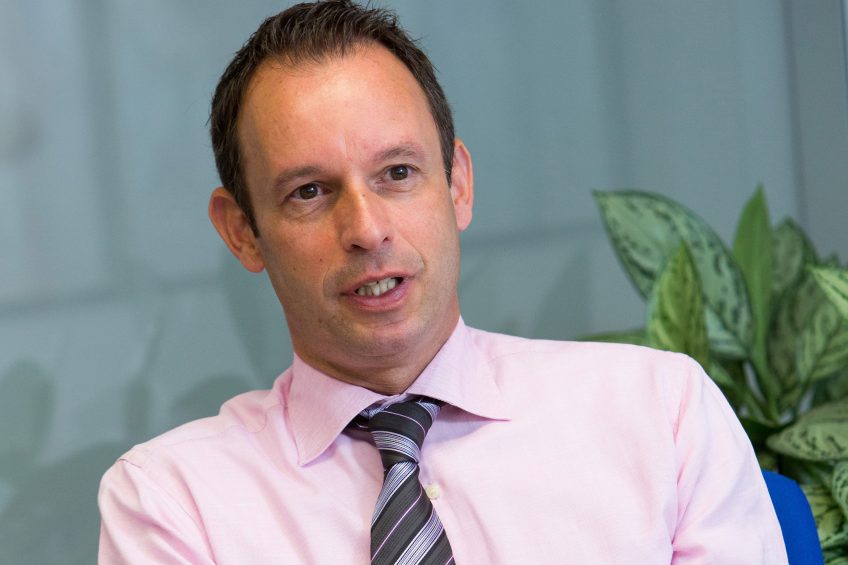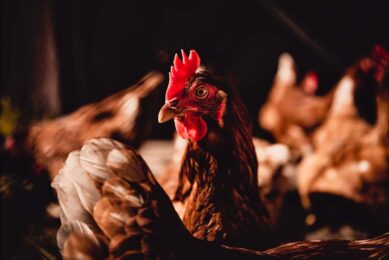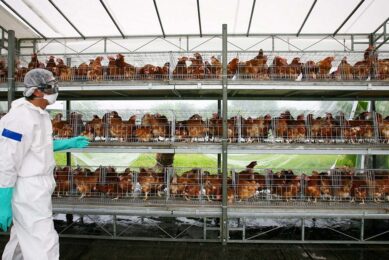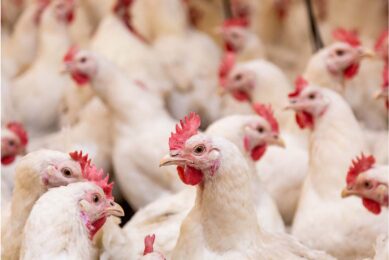The “humble egg” is making waves

Poultry World talks to Ben Dellaert and Tim Lambert. As Dellaert is looking back on his two year stint as chairman of the International Egg Commission, Lambert is ready to pick up the gloves. Both share the firm believe that the ‘humble egg’ is making waves and will continue to do so.
Improving communications and ensuring that the International Egg Commission had good links with key global organisations were two issues that Ben Dellaert was keen to address when he took up the role of chairman at the 2015 Berlin autumn conference. Mr Dellaert felt that too often the excellent work the IEC had been doing had not necessarily been communicated around the globe.
“We do all these wonderful projects but sometimes we forget to communicate them. In the past, sometimes we haven’t informed the rest of the world outside our industry and on some occasions we haven’t even informed our members. “So, it has been a major thread for me to ensure that we don’t forget to communicate and I’m happy to see that our use for example of social media has grown. It is a good start but we must do more.”
Mr Dellaert also wanted to ensure that links with key global organisations, such as the OIE, the World Health Organisation and the Consumer Goods Forum were enhanced. “The OIE is very important – not only on updating us on the avian influenza situation but also with the incoming standards for the welfare of laying hens, which will be extremely important for several regions in the world.”
And a third issue that Mr Dellaert felt strongly about when starting his tenure was to reach out to companies and organisations that were unable to attend either the IEC’s spring business conference or autumn global leadership event. “While it is great to see so many delegates at our conferences, there were ultimately a large number of groups and companies who do not want to spend the time or money travelling often long distances to our events. “We knew they were interested in receiving our information and so we decided to go out to the regions to meet them and promote our work.”
Avian influenza expert group
So what has happened over the past two years? During his tenure, the IEC has firmly established its Avian Influenza expert group, which was formed in the wake of the massive outbreak across the United States in 2015. The IEC has also set up the Global Roundtable for Sustainable Egg Production (GRSE) in 2015, which was established as a multi-stakeholder initiative with representation across the value chain in egg production and consumption. The programme is aimed at stimulating discussion and addressing initiatives that will carve the way for sustainable egg production for future generations. It has put in place a series of regional seminars, which started in Bangkok, Thailand, in 2015, Buenos Aires in 2016 and last year the IEC launched the first tranche of Young Egg Leaders in order to foster existing talents within the egg industry. Its World Egg Day activities last October trended on twitter for the first time.
Unsurprisingly, Mr Dellaert is happy with the progress: “We’ve had some excellent regional events in the Far East and are going to India in November and South America (Colombia) early next year. “And we are launching another type of membership for companies which don’t require a full membership. This will give them access to a lot of very useful information.”
He is delighted with the achievements of the young egg ambassadors – now in its second year. This year’s intake has visited the OIE, Consumer Goods Forum and IEC headquarters in London and provided an excellent presentation on the need for members to increase their social media interaction with the public. “Around 99% of our businesses are family companies often with the second and third generation coming up. But until a couple of years ago we were not able to get them to join us. We decided to offer them a full programme of activities so that – on top of their jobs – they can find out what is going on in the egg industry around the world. “We’ve already had a number of young people asking if they can join the third year’s scheme.”
He is keen that members receive the latest information and is pleased that the AI Expert Group has produced a biosecurity check list and information on vaccination. “The IEC has a key role to play in providing information on biosecurity and vaccination. While vaccination may not be the right answer for some, this will help inform country organisations, industry and governments.”
He is also delighted with the IEC’s International Egg Nutrition Consortium, which provides members with ideas and resources, research and educational programmes, input and information in a crisis and can identify international experts on specific topics. There have been challenges along the way – the ongoing spread of avian influenza over the past two years has been a constant headache – and the fipronil fraud scandal has shown that the industry must constantly be on its guard. But there are also opportunities for the IEC: “There is a mass of companies across the globe, particularly in India and China/Southeast Asia, who aren’t members yet. And I’m also excited by some of the potential technological innovation opportunities that are around the corner,” he added.

Lambert new IEC chair
With Dellaerts term ending, Tim Lambert was chosen as the new IEC chair. He is no stranger to holding the reins of influential organisations. For the past 14 years, he has been chief executive officer of Egg Farmers of Canada, whose 1,000 family farms produce close to 600m dozen eggs annually to meet growing consumer demand. Last year marked the industry’s tenth consecutive year of retail sales growth and the industry has grown by 30% in that period, making it possible for farmers to make long-term investment in on-farm efficiencies and drive innovation through research and development.
Lambert believes the bedrock of this success lies in trust. Polls have shown that egg farmers are one of the most trusted professions in Canada and he believes this is due to farmers’ commitment to their community, their environment and their society. In recent years he has regularly presented at the International Egg Commission annual Global Leadership Conference – the first of which he attended in Santiago in 2003 – and each time he highlights key principles which have helped drive success for the Egg Farmers of Canada. These are: Understanding the core strengths of your product, Build trust through partnerships, Walk the talk, Embrace environmental sustainability and Back up your story.
He is keen that the next generation of egg farmers practices these principles and chairs the IEC’s Young Egg Leaders (YEL) and is also a founding trustee of the International Egg Foundation, which is doing invaluable work in Swaziland, is set to work in partnership to improve agricultural education at a college in Mozambique. He feels the IEC has developed strongly in recent years, pointing to its collaboration with the World Animal Health Organisation (OIE) over avian influenza and the proposed standards for laying hens, the Consumer Goods Forum and now the World Health Organisation.
And he is excited about the IEC’s Nutrition Consortium and how the “humble egg” is making waves in major scientific studies. Of course, there are major challenges ahead – not least the fact that avian influenza is not going to disappear anytime soon and fipronil has knocked parts of the European egg sector sideways. But Lambert believes there is huge opportunity to grow: “There is phenomenal potential to grow our opportunities in the egg industry, regardless of country. “People understand the nutritional values of eggs and there are massive opportunities in the growing Asian, Indian and Latin American markets.” Mr Lambert acknowledges that the IEC has made strides in communications using social media but acknowledges this is an area for continual improvement, “People want to know more about high quality food and they get a lot of their information from social media and blogs. We have to make sure we tell that story.”
Animal welfare
While consumers have growing interests across the globe in animal welfare issues, Mr Lambert believes it is important for farmers to adopt measures that meet the needs of their different regions and for the IEC to provide advice where necessary. One welfare issue affecting Canada is male chick culling and there has been interest in the work of the Egg Farmers of Ontario, which has patented a process which it claims can determine the sex of a chick pre-incubation. The discovery came out of work with Quebec’s McGill University to determine the hatchability of eggs based on a novel candling technique. Mr Lambert said he hoped that some small scale commercial trials would take place later this year, but added there was still lots of work to be done. “It may not be a massive problem in Canada but how we deal with male chick sexing is an emerging one,” he said.
One of his priorities for his anticipated two year chairmanship of the IEC is to build on the successful regional seminars that began in 2015: “Not everyone has the opportunity or resources to come but it is important for us to show the value of the IEC and we can do that by going to them. “Farmers have specific priorities in particular countries – there are very different issues in India, China and south America – and it is good to help them with a tailor made industry programme as well as speaking to potential new members.” But allied to this is the need to communicate the core aspects of all the work the IEC is doing. “Communications are becoming cheaper and we must embrace all aspects of social media to tell our stories and build markets. We’re doing a good job now but can do even more.”
Join 31,000+ subscribers
Subscribe to our newsletter to stay updated about all the need-to-know content in the poultry sector, three times a week. Beheer
Beheer








 WP Admin
WP Admin  Bewerk bericht
Bewerk bericht